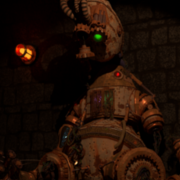I think it would sort of depend on how varied you wanted it to be. Provided you had your level editor pretty much set up, doing what you ask there wouldn't be terribly difficult in and of itself, I wouldn't think. I mean, if you only provided a small set of options, say, ball, square / slope and plane, setting that up wouldn't be too hard.
If, on the other hand, you want to account for anything that might be typed in, that gets much, much more difficult, I imagine. I think if you limit the options to a set of pre-defined things, such as a set of geometric shapes, and a set of different inclines, etc. something like this wouldn't be terribly difficult to implement.
You're posting in the AI section though, so I imagine you're wanting a more robust handling of things, and I couldn't begin to offer a good solution there. But, I think if you considered scaling down the scope, and had a defined set of things the user knew they could type, you'd be in much simpler territory.










